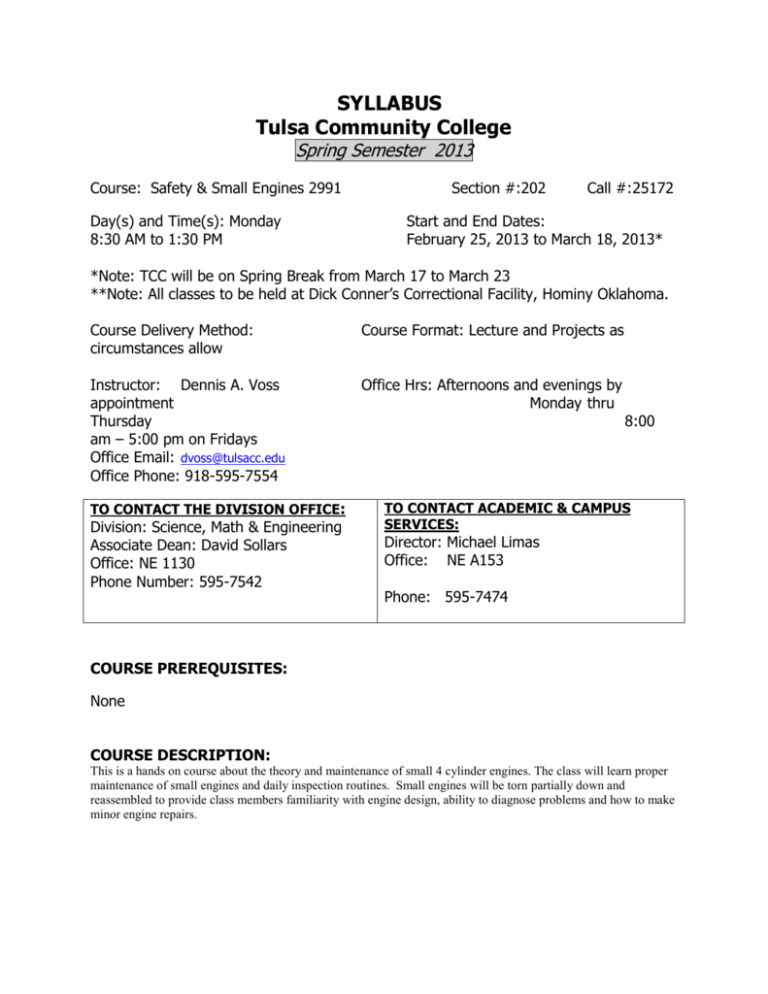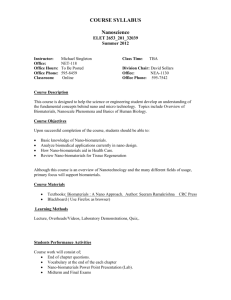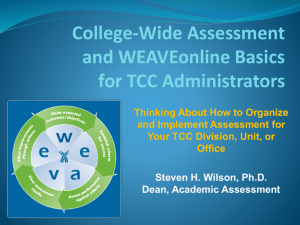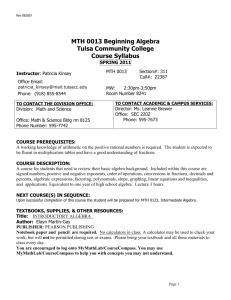HORT_2991_202_25172_201320 (new window)
advertisement

SYLLABUS
Tulsa Community College
Spring Semester 2013
Course: Safety & Small Engines 2991
Day(s) and Time(s): Monday
8:30 AM to 1:30 PM
Section #:202
Call #:25172
Start and End Dates:
February 25, 2013 to March 18, 2013*
*Note: TCC will be on Spring Break from March 17 to March 23
**Note: All classes to be held at Dick Conner’s Correctional Facility, Hominy Oklahoma.
Course Delivery Method:
circumstances allow
Course Format: Lecture and Projects as
Instructor: Dennis A. Voss
appointment
Thursday
am – 5:00 pm on Fridays
Office Email: dvoss@tulsacc.edu
Office Phone: 918-595-7554
Office Hrs: Afternoons and evenings by
Monday thru
TO CONTACT THE DIVISION OFFICE:
Division: Science, Math & Engineering
Associate Dean: David Sollars
Office: NE 1130
Phone Number: 595-7542
8:00
TO CONTACT ACADEMIC & CAMPUS
SERVICES:
Director: Michael Limas
Office: NE A153
Phone: 595-7474
COURSE PREREQUISITES:
None
COURSE DESCRIPTION:
This is a hands on course about the theory and maintenance of small 4 cylinder engines. The class will learn proper
maintenance of small engines and daily inspection routines. Small engines will be torn partially down and
reassembled to provide class members familiarity with engine design, ability to diagnose problems and how to make
minor engine repairs.
NEXT COURSE(S) IN SEQUENCE:
None, various coarse resources and handouts provided.
COURSE OBJECTIVES:
This is a course for students planning to enter horticulture or horticulture related fields
of employment in the near future. It is intended to provide a practical back ground in
plant science necessary for employment in the horticulture industry.
1. A practical application of maintenance and basic repair of small engines &
equipment safety.
2. Learning important safety factors for operation of small engines & associated
equipment.
3. A basic understanding of how small engines work.
4. A basic understanding of how to maintain a small engine.
5. A basic understanding of how to partially disassemble and reassemble a small
engine.
6. A basic understanding of how to make minor repairs.
TEACHING METHODS:
Lectures, discussion, hands on projects, power points, videos, reading assignments, and
handouts.
EVALUATION TECHNIQUES:
Evaluation techniques will be based on class participation, quizzes, student projects and
occasional tests on topics covered.
Class participation and or projects as class allows
Points
In class hands on activities & reports
Points
Quizzes and tests
Points
Total
Points
Some variation from the percentages may occur depending on available lecture
and scheduling of events.
200
200
200
600
time
Grading Scale
A
B
C
D
F
90%-100%
80%-89%
70%-79%
60%-69%
59% and Below
ATTENDANCE:
It is the student’s responsibility to attend class regularly, keep up with class work, lab
exercises, and all reading assignments. Records of class and lab attendance will be
maintained.
LATE ASSIGNMENTS AND MAKE-UP WORK:
(1) Tests cannot be made up after tests have been given.
(2) Class exercises cannot be made up.
(3) Home work is due at the start of the next class.
Course Withdrawal: The deadline to withdraw from a course ('W' grade) or to
change from Credit to Audit is noted on the TCC academic calendar found in the Fall
Schedule. Check the TCC Academic Calendar for other deadlines. Students who stop
participating in the course and fail to withdraw may receive a course grade of “F,”
which may have financial aid consequences for the student.
COMMUNICATIONS:
Email: All TCC students receive a designated “My TCC” email address (ex:
jane.doe@mail.tulsacc.edu). Any e-mail communications to you about TCC and course
assignments will be sent to you’re “My TCC” email address or found on Black Board;
and you must use “My TCC” email to send email to, and receive email from, the
instructor regarding this course.
Inclement Weather: TCC rarely closes. If extreme weather conditions or emergency
situations arise alternate study methods and subjects will be assigned for completion on
the students own time
GENERAL EDUCATION GOALS: General Education courses at TCC ensure that our
graduates gain skills, knowledge, and abilities that comprise a common foundation for
their higher education and a backdrop for their work and personal lives. TCC’s General
Education goals are: Critical Thinking, Effective Communication, Engaged Learning, and
Technological Proficiency.
CLASSROOM ETIQUETTE: Open and mutually respectful communication of varied
opinions, beliefs, and perspectives during classroom or online discussion encourages
the free exchange of ideas that is essential to higher learning and to the ability to learn
from each other. Use of any electronic device is at the discretion of the instructor.
Periodic class breaks will be allowed at which time we all break together.
SYLLABUS CHANGES: Occasionally, changes to the syllabus may be necessary.
Changes will be discussed in class, no other source of notification is guaranteed.
Changes will be posted on Black Board if possible.
STUDENTS WITH DISABILITIES: TCC provides accommodations for qualifying
students in compliance with the Americans with Disabilities Act. For information,
students may contact the disabled Student Resource Center, 918-595-7115, or the
Resource Center for the Deaf and Hard of Hearing, 918-595-7428V, 918-595-7434TTY.
ACADEMIC DISHONESTY: Academic dishonesty (cheating) is defined as the
deception of others about one’s own work or about the work of another. Academic
dishonesty or misconduct is not condoned or tolerated at campuses within the Tulsa
Community College system. Tulsa Community College adopts a policy delegating certain
forms of authority for disciplinary action to the faculty. Such disciplinary actions
delegated to the faculty include, but are not limited to, the dismissal of disrespectful or
disorderly students from classes. In the case of academic dishonesty a faculty member
may:
Require the student to redo an assignment or test, or require the student to
complete a substitute assignment or test;
Record a "zero" for the assignment or test in question;
Recommend to the student that the student withdraw from the class, or
administratively withdraw the student from the class;
Record a grade of "F" for the student at the end of the semester. Faculty may
request that disciplinary action be taken against a student at the
administrative level by submitting such a request to the Dean of Student
Services.
INSTITUTIONAL STATEMENT: Each student is responsible for being aware of
the information contained in the TCC Catalog, the TCC Student Policies &
Resources Handbook, and semester information listed in the class schedule. All
information may be viewed on the TCC website: www.tulsacc.edu
TENTATIVE COURSE CALENDAR:
DATE
TOPIC
ASSIGNMENT
TEXT
02/27/2012
Lecture: Introduction to instructor and course.
Safety & introduction to engines. review of maintenance routines.
01/30/2012
Lecture: Safety test, Small engine tear down and reassembly
02/06/2012
Lecture: Small engine tear down and reassembly
02/13/2012
Lecture: Small engine tear down and reassembly and test






